Analysis of Evidence-Based Practice in Health and Social Care
VerifiedAdded on 2021/01/01
|9
|2331
|327
Report
AI Summary
This report delves into the fundamentals of evidence-based practice (EBP) within the context of health and social care. It begins by emphasizing the critical importance of EBP in improving patient outcomes and quality of life, highlighting the integration of both external evidence (systematic reviews, clinical guidelines) and internal evidence (clinical expertise, quality improvement projects). The report outlines the EBP process, detailing the essential steps from formulating a compelling question to evaluating the effectiveness of implemented practices. It then explores the required skills and qualities for conducting a literature review, differentiating between personal and professional attributes, and provides a self-assessment of the author's own capabilities. The report further examines the skills necessary for ethical research, emphasizing the importance of informed consent, minimizing harm, and protecting patient privacy. Several articles are summarized, including discussions on communication skills in challenging situations, overcoming barriers to effective communication, and the benefits of effective communication for patients. The literature review supports the aim of the investigation by explaining the significance of effective communication in health and social care to improve patient outcomes. Finally, a project proposal is presented, outlining the background, literature review, aim, objectives, methodology, and ethical considerations for a study on the impact of effective communication on patient outcomes. The report concludes that effective communication is helpful to reduce the risk of complications in health and improve outcomes of sick individuals.
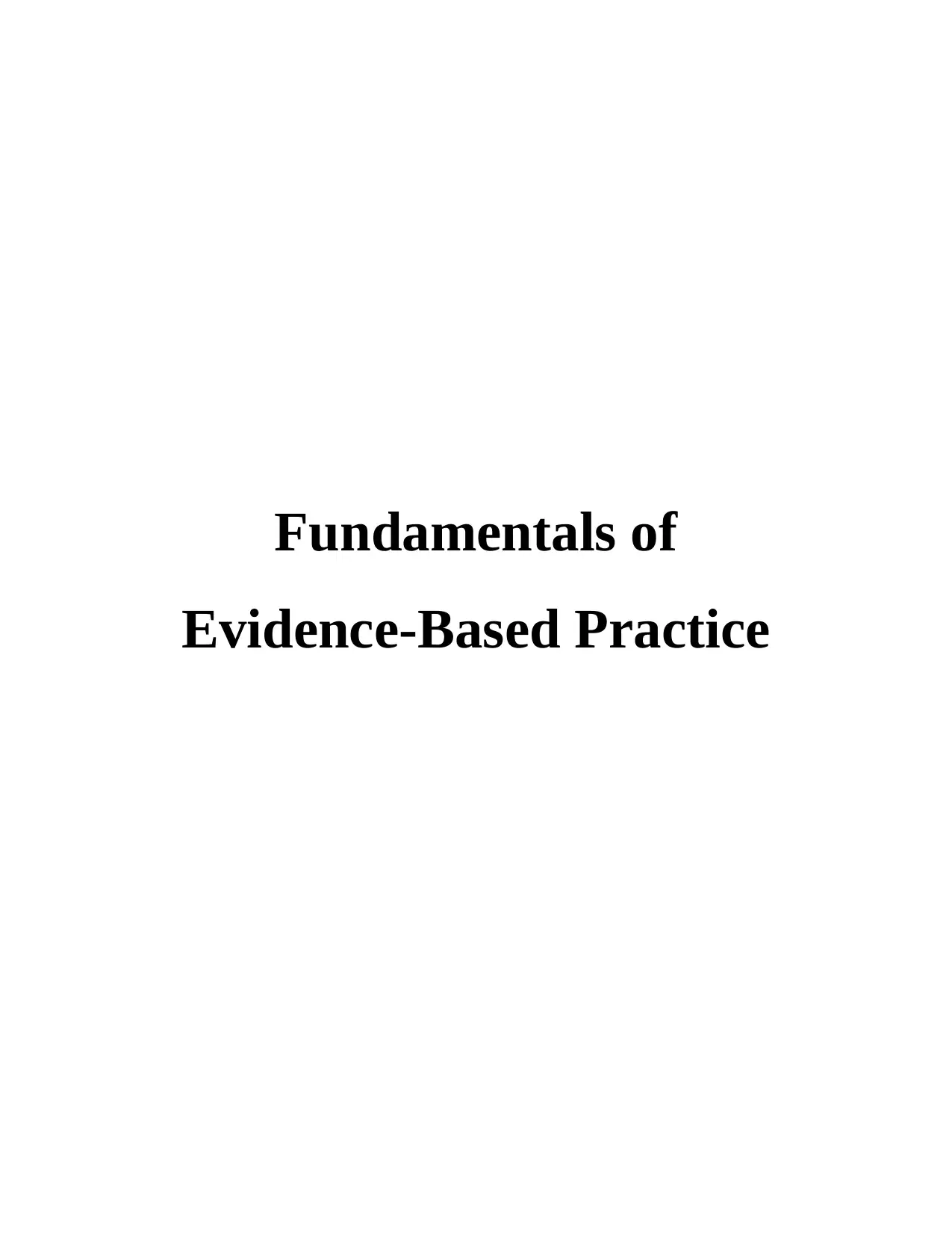
Fundamentals of
Evidence-Based Practice
Evidence-Based Practice
Paraphrase This Document
Need a fresh take? Get an instant paraphrase of this document with our AI Paraphraser

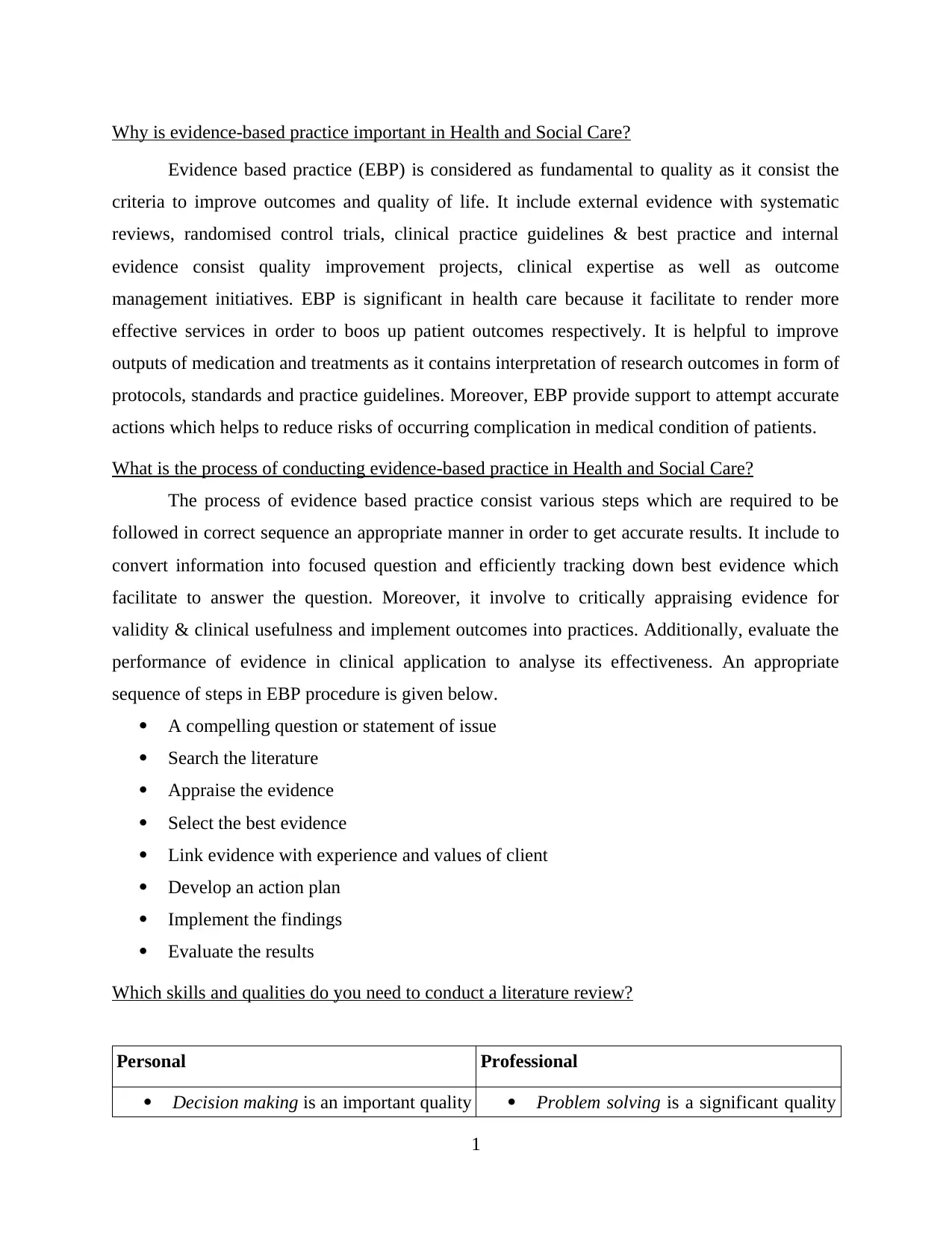
Why is evidence-based practice important in Health and Social Care?
Evidence based practice (EBP) is considered as fundamental to quality as it consist the
criteria to improve outcomes and quality of life. It include external evidence with systematic
reviews, randomised control trials, clinical practice guidelines & best practice and internal
evidence consist quality improvement projects, clinical expertise as well as outcome
management initiatives. EBP is significant in health care because it facilitate to render more
effective services in order to boos up patient outcomes respectively. It is helpful to improve
outputs of medication and treatments as it contains interpretation of research outcomes in form of
protocols, standards and practice guidelines. Moreover, EBP provide support to attempt accurate
actions which helps to reduce risks of occurring complication in medical condition of patients.
What is the process of conducting evidence-based practice in Health and Social Care?
The process of evidence based practice consist various steps which are required to be
followed in correct sequence an appropriate manner in order to get accurate results. It include to
convert information into focused question and efficiently tracking down best evidence which
facilitate to answer the question. Moreover, it involve to critically appraising evidence for
validity & clinical usefulness and implement outcomes into practices. Additionally, evaluate the
performance of evidence in clinical application to analyse its effectiveness. An appropriate
sequence of steps in EBP procedure is given below.
A compelling question or statement of issue
Search the literature
Appraise the evidence
Select the best evidence
Link evidence with experience and values of client
Develop an action plan
Implement the findings
Evaluate the results
Which skills and qualities do you need to conduct a literature review?
Personal Professional
Decision making is an important quality Problem solving is a significant quality
1
Evidence based practice (EBP) is considered as fundamental to quality as it consist the
criteria to improve outcomes and quality of life. It include external evidence with systematic
reviews, randomised control trials, clinical practice guidelines & best practice and internal
evidence consist quality improvement projects, clinical expertise as well as outcome
management initiatives. EBP is significant in health care because it facilitate to render more
effective services in order to boos up patient outcomes respectively. It is helpful to improve
outputs of medication and treatments as it contains interpretation of research outcomes in form of
protocols, standards and practice guidelines. Moreover, EBP provide support to attempt accurate
actions which helps to reduce risks of occurring complication in medical condition of patients.
What is the process of conducting evidence-based practice in Health and Social Care?
The process of evidence based practice consist various steps which are required to be
followed in correct sequence an appropriate manner in order to get accurate results. It include to
convert information into focused question and efficiently tracking down best evidence which
facilitate to answer the question. Moreover, it involve to critically appraising evidence for
validity & clinical usefulness and implement outcomes into practices. Additionally, evaluate the
performance of evidence in clinical application to analyse its effectiveness. An appropriate
sequence of steps in EBP procedure is given below.
A compelling question or statement of issue
Search the literature
Appraise the evidence
Select the best evidence
Link evidence with experience and values of client
Develop an action plan
Implement the findings
Evaluate the results
Which skills and qualities do you need to conduct a literature review?
Personal Professional
Decision making is an important quality Problem solving is a significant quality
1
⊘ This is a preview!⊘
Do you want full access?
Subscribe today to unlock all pages.

Trusted by 1+ million students worldwide
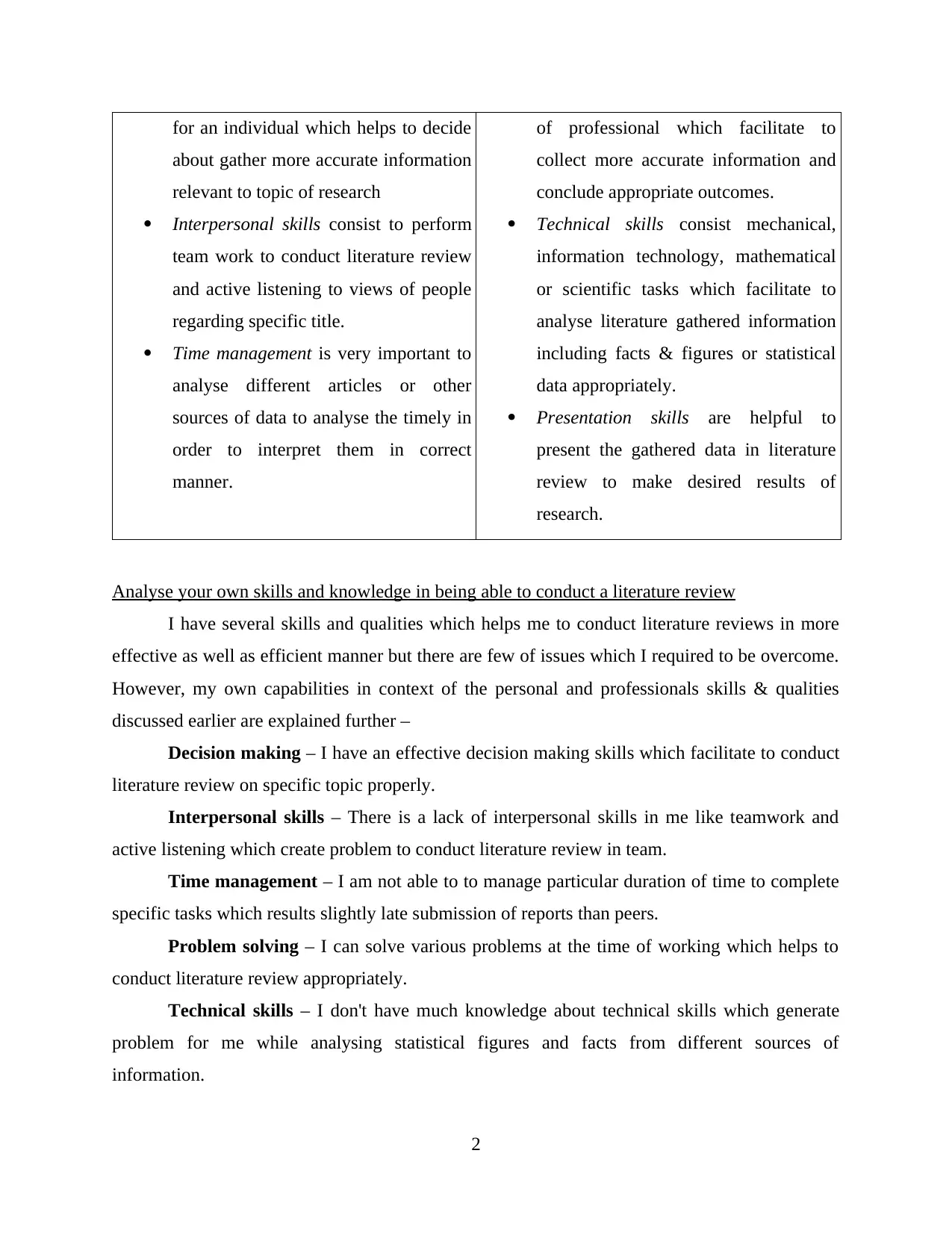
for an individual which helps to decide
about gather more accurate information
relevant to topic of research
Interpersonal skills consist to perform
team work to conduct literature review
and active listening to views of people
regarding specific title.
Time management is very important to
analyse different articles or other
sources of data to analyse the timely in
order to interpret them in correct
manner.
of professional which facilitate to
collect more accurate information and
conclude appropriate outcomes.
Technical skills consist mechanical,
information technology, mathematical
or scientific tasks which facilitate to
analyse literature gathered information
including facts & figures or statistical
data appropriately.
Presentation skills are helpful to
present the gathered data in literature
review to make desired results of
research.
Analyse your own skills and knowledge in being able to conduct a literature review
I have several skills and qualities which helps me to conduct literature reviews in more
effective as well as efficient manner but there are few of issues which I required to be overcome.
However, my own capabilities in context of the personal and professionals skills & qualities
discussed earlier are explained further –
Decision making – I have an effective decision making skills which facilitate to conduct
literature review on specific topic properly.
Interpersonal skills – There is a lack of interpersonal skills in me like teamwork and
active listening which create problem to conduct literature review in team.
Time management – I am not able to to manage particular duration of time to complete
specific tasks which results slightly late submission of reports than peers.
Problem solving – I can solve various problems at the time of working which helps to
conduct literature review appropriately.
Technical skills – I don't have much knowledge about technical skills which generate
problem for me while analysing statistical figures and facts from different sources of
information.
2
about gather more accurate information
relevant to topic of research
Interpersonal skills consist to perform
team work to conduct literature review
and active listening to views of people
regarding specific title.
Time management is very important to
analyse different articles or other
sources of data to analyse the timely in
order to interpret them in correct
manner.
of professional which facilitate to
collect more accurate information and
conclude appropriate outcomes.
Technical skills consist mechanical,
information technology, mathematical
or scientific tasks which facilitate to
analyse literature gathered information
including facts & figures or statistical
data appropriately.
Presentation skills are helpful to
present the gathered data in literature
review to make desired results of
research.
Analyse your own skills and knowledge in being able to conduct a literature review
I have several skills and qualities which helps me to conduct literature reviews in more
effective as well as efficient manner but there are few of issues which I required to be overcome.
However, my own capabilities in context of the personal and professionals skills & qualities
discussed earlier are explained further –
Decision making – I have an effective decision making skills which facilitate to conduct
literature review on specific topic properly.
Interpersonal skills – There is a lack of interpersonal skills in me like teamwork and
active listening which create problem to conduct literature review in team.
Time management – I am not able to to manage particular duration of time to complete
specific tasks which results slightly late submission of reports than peers.
Problem solving – I can solve various problems at the time of working which helps to
conduct literature review appropriately.
Technical skills – I don't have much knowledge about technical skills which generate
problem for me while analysing statistical figures and facts from different sources of
information.
2
Paraphrase This Document
Need a fresh take? Get an instant paraphrase of this document with our AI Paraphraser
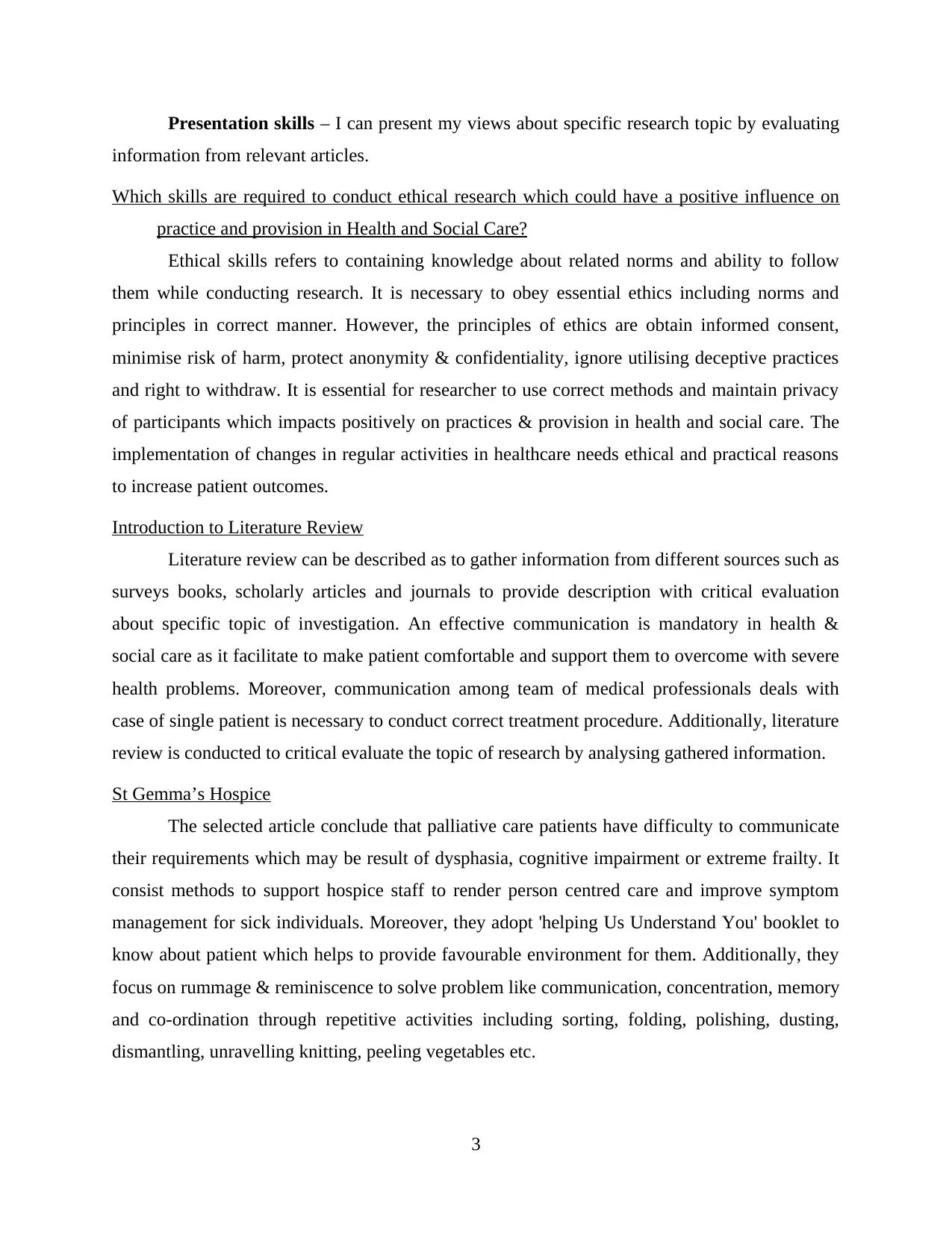
Presentation skills – I can present my views about specific research topic by evaluating
information from relevant articles.
Which skills are required to conduct ethical research which could have a positive influence on
practice and provision in Health and Social Care?
Ethical skills refers to containing knowledge about related norms and ability to follow
them while conducting research. It is necessary to obey essential ethics including norms and
principles in correct manner. However, the principles of ethics are obtain informed consent,
minimise risk of harm, protect anonymity & confidentiality, ignore utilising deceptive practices
and right to withdraw. It is essential for researcher to use correct methods and maintain privacy
of participants which impacts positively on practices & provision in health and social care. The
implementation of changes in regular activities in healthcare needs ethical and practical reasons
to increase patient outcomes.
Introduction to Literature Review
Literature review can be described as to gather information from different sources such as
surveys books, scholarly articles and journals to provide description with critical evaluation
about specific topic of investigation. An effective communication is mandatory in health &
social care as it facilitate to make patient comfortable and support them to overcome with severe
health problems. Moreover, communication among team of medical professionals deals with
case of single patient is necessary to conduct correct treatment procedure. Additionally, literature
review is conducted to critical evaluate the topic of research by analysing gathered information.
St Gemma’s Hospice
The selected article conclude that palliative care patients have difficulty to communicate
their requirements which may be result of dysphasia, cognitive impairment or extreme frailty. It
consist methods to support hospice staff to render person centred care and improve symptom
management for sick individuals. Moreover, they adopt 'helping Us Understand You' booklet to
know about patient which helps to provide favourable environment for them. Additionally, they
focus on rummage & reminiscence to solve problem like communication, concentration, memory
and co-ordination through repetitive activities including sorting, folding, polishing, dusting,
dismantling, unravelling knitting, peeling vegetables etc.
3
information from relevant articles.
Which skills are required to conduct ethical research which could have a positive influence on
practice and provision in Health and Social Care?
Ethical skills refers to containing knowledge about related norms and ability to follow
them while conducting research. It is necessary to obey essential ethics including norms and
principles in correct manner. However, the principles of ethics are obtain informed consent,
minimise risk of harm, protect anonymity & confidentiality, ignore utilising deceptive practices
and right to withdraw. It is essential for researcher to use correct methods and maintain privacy
of participants which impacts positively on practices & provision in health and social care. The
implementation of changes in regular activities in healthcare needs ethical and practical reasons
to increase patient outcomes.
Introduction to Literature Review
Literature review can be described as to gather information from different sources such as
surveys books, scholarly articles and journals to provide description with critical evaluation
about specific topic of investigation. An effective communication is mandatory in health &
social care as it facilitate to make patient comfortable and support them to overcome with severe
health problems. Moreover, communication among team of medical professionals deals with
case of single patient is necessary to conduct correct treatment procedure. Additionally, literature
review is conducted to critical evaluate the topic of research by analysing gathered information.
St Gemma’s Hospice
The selected article conclude that palliative care patients have difficulty to communicate
their requirements which may be result of dysphasia, cognitive impairment or extreme frailty. It
consist methods to support hospice staff to render person centred care and improve symptom
management for sick individuals. Moreover, they adopt 'helping Us Understand You' booklet to
know about patient which helps to provide favourable environment for them. Additionally, they
focus on rummage & reminiscence to solve problem like communication, concentration, memory
and co-ordination through repetitive activities including sorting, folding, polishing, dusting,
dismantling, unravelling knitting, peeling vegetables etc.
3
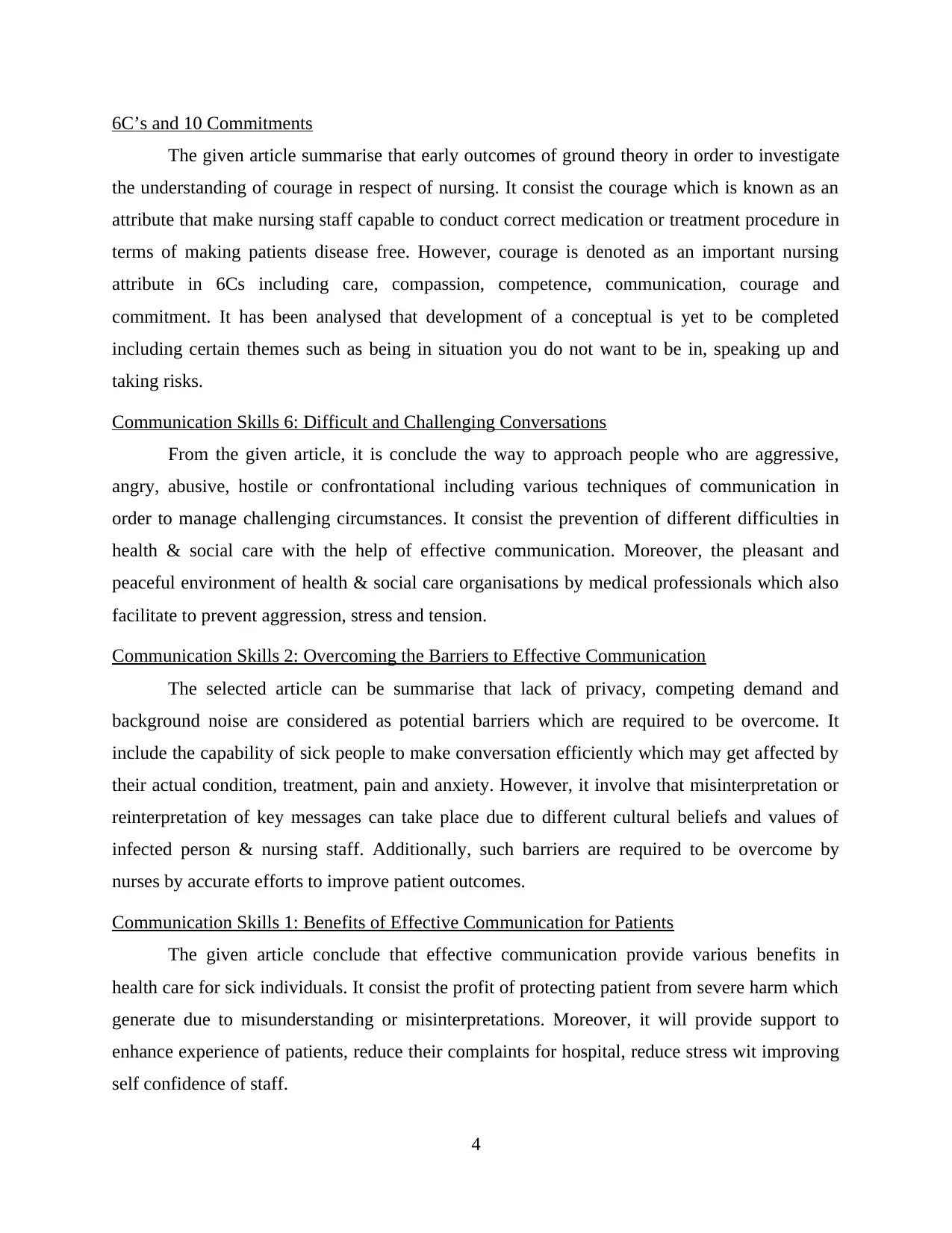
6C’s and 10 Commitments
The given article summarise that early outcomes of ground theory in order to investigate
the understanding of courage in respect of nursing. It consist the courage which is known as an
attribute that make nursing staff capable to conduct correct medication or treatment procedure in
terms of making patients disease free. However, courage is denoted as an important nursing
attribute in 6Cs including care, compassion, competence, communication, courage and
commitment. It has been analysed that development of a conceptual is yet to be completed
including certain themes such as being in situation you do not want to be in, speaking up and
taking risks.
Communication Skills 6: Difficult and Challenging Conversations
From the given article, it is conclude the way to approach people who are aggressive,
angry, abusive, hostile or confrontational including various techniques of communication in
order to manage challenging circumstances. It consist the prevention of different difficulties in
health & social care with the help of effective communication. Moreover, the pleasant and
peaceful environment of health & social care organisations by medical professionals which also
facilitate to prevent aggression, stress and tension.
Communication Skills 2: Overcoming the Barriers to Effective Communication
The selected article can be summarise that lack of privacy, competing demand and
background noise are considered as potential barriers which are required to be overcome. It
include the capability of sick people to make conversation efficiently which may get affected by
their actual condition, treatment, pain and anxiety. However, it involve that misinterpretation or
reinterpretation of key messages can take place due to different cultural beliefs and values of
infected person & nursing staff. Additionally, such barriers are required to be overcome by
nurses by accurate efforts to improve patient outcomes.
Communication Skills 1: Benefits of Effective Communication for Patients
The given article conclude that effective communication provide various benefits in
health care for sick individuals. It consist the profit of protecting patient from severe harm which
generate due to misunderstanding or misinterpretations. Moreover, it will provide support to
enhance experience of patients, reduce their complaints for hospital, reduce stress wit improving
self confidence of staff.
4
The given article summarise that early outcomes of ground theory in order to investigate
the understanding of courage in respect of nursing. It consist the courage which is known as an
attribute that make nursing staff capable to conduct correct medication or treatment procedure in
terms of making patients disease free. However, courage is denoted as an important nursing
attribute in 6Cs including care, compassion, competence, communication, courage and
commitment. It has been analysed that development of a conceptual is yet to be completed
including certain themes such as being in situation you do not want to be in, speaking up and
taking risks.
Communication Skills 6: Difficult and Challenging Conversations
From the given article, it is conclude the way to approach people who are aggressive,
angry, abusive, hostile or confrontational including various techniques of communication in
order to manage challenging circumstances. It consist the prevention of different difficulties in
health & social care with the help of effective communication. Moreover, the pleasant and
peaceful environment of health & social care organisations by medical professionals which also
facilitate to prevent aggression, stress and tension.
Communication Skills 2: Overcoming the Barriers to Effective Communication
The selected article can be summarise that lack of privacy, competing demand and
background noise are considered as potential barriers which are required to be overcome. It
include the capability of sick people to make conversation efficiently which may get affected by
their actual condition, treatment, pain and anxiety. However, it involve that misinterpretation or
reinterpretation of key messages can take place due to different cultural beliefs and values of
infected person & nursing staff. Additionally, such barriers are required to be overcome by
nurses by accurate efforts to improve patient outcomes.
Communication Skills 1: Benefits of Effective Communication for Patients
The given article conclude that effective communication provide various benefits in
health care for sick individuals. It consist the profit of protecting patient from severe harm which
generate due to misunderstanding or misinterpretations. Moreover, it will provide support to
enhance experience of patients, reduce their complaints for hospital, reduce stress wit improving
self confidence of staff.
4
⊘ This is a preview!⊘
Do you want full access?
Subscribe today to unlock all pages.

Trusted by 1+ million students worldwide
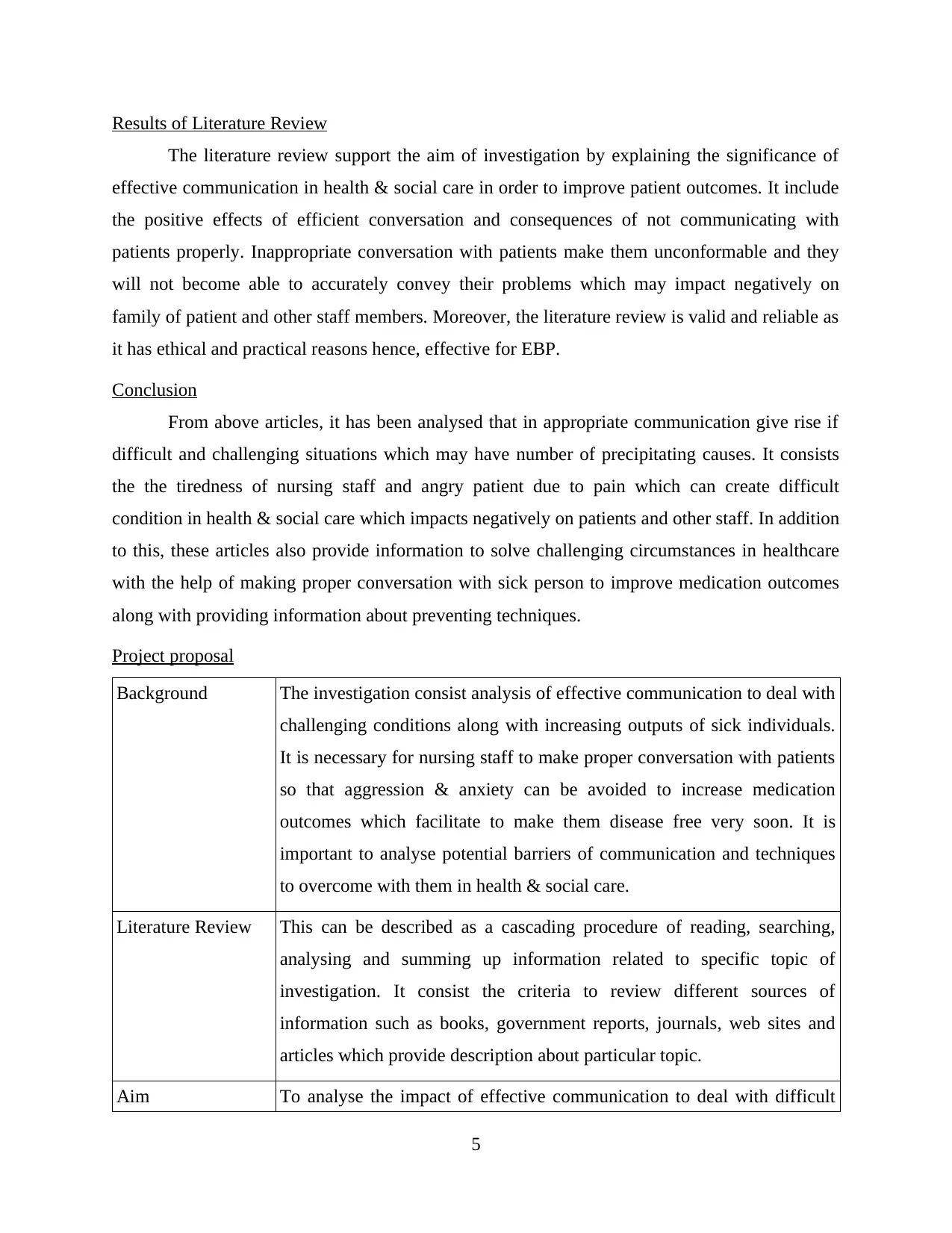
Results of Literature Review
The literature review support the aim of investigation by explaining the significance of
effective communication in health & social care in order to improve patient outcomes. It include
the positive effects of efficient conversation and consequences of not communicating with
patients properly. Inappropriate conversation with patients make them unconformable and they
will not become able to accurately convey their problems which may impact negatively on
family of patient and other staff members. Moreover, the literature review is valid and reliable as
it has ethical and practical reasons hence, effective for EBP.
Conclusion
From above articles, it has been analysed that in appropriate communication give rise if
difficult and challenging situations which may have number of precipitating causes. It consists
the the tiredness of nursing staff and angry patient due to pain which can create difficult
condition in health & social care which impacts negatively on patients and other staff. In addition
to this, these articles also provide information to solve challenging circumstances in healthcare
with the help of making proper conversation with sick person to improve medication outcomes
along with providing information about preventing techniques.
Project proposal
Background The investigation consist analysis of effective communication to deal with
challenging conditions along with increasing outputs of sick individuals.
It is necessary for nursing staff to make proper conversation with patients
so that aggression & anxiety can be avoided to increase medication
outcomes which facilitate to make them disease free very soon. It is
important to analyse potential barriers of communication and techniques
to overcome with them in health & social care.
Literature Review This can be described as a cascading procedure of reading, searching,
analysing and summing up information related to specific topic of
investigation. It consist the criteria to review different sources of
information such as books, government reports, journals, web sites and
articles which provide description about particular topic.
Aim To analyse the impact of effective communication to deal with difficult
5
The literature review support the aim of investigation by explaining the significance of
effective communication in health & social care in order to improve patient outcomes. It include
the positive effects of efficient conversation and consequences of not communicating with
patients properly. Inappropriate conversation with patients make them unconformable and they
will not become able to accurately convey their problems which may impact negatively on
family of patient and other staff members. Moreover, the literature review is valid and reliable as
it has ethical and practical reasons hence, effective for EBP.
Conclusion
From above articles, it has been analysed that in appropriate communication give rise if
difficult and challenging situations which may have number of precipitating causes. It consists
the the tiredness of nursing staff and angry patient due to pain which can create difficult
condition in health & social care which impacts negatively on patients and other staff. In addition
to this, these articles also provide information to solve challenging circumstances in healthcare
with the help of making proper conversation with sick person to improve medication outcomes
along with providing information about preventing techniques.
Project proposal
Background The investigation consist analysis of effective communication to deal with
challenging conditions along with increasing outputs of sick individuals.
It is necessary for nursing staff to make proper conversation with patients
so that aggression & anxiety can be avoided to increase medication
outcomes which facilitate to make them disease free very soon. It is
important to analyse potential barriers of communication and techniques
to overcome with them in health & social care.
Literature Review This can be described as a cascading procedure of reading, searching,
analysing and summing up information related to specific topic of
investigation. It consist the criteria to review different sources of
information such as books, government reports, journals, web sites and
articles which provide description about particular topic.
Aim To analyse the impact of effective communication to deal with difficult
5
Paraphrase This Document
Need a fresh take? Get an instant paraphrase of this document with our AI Paraphraser
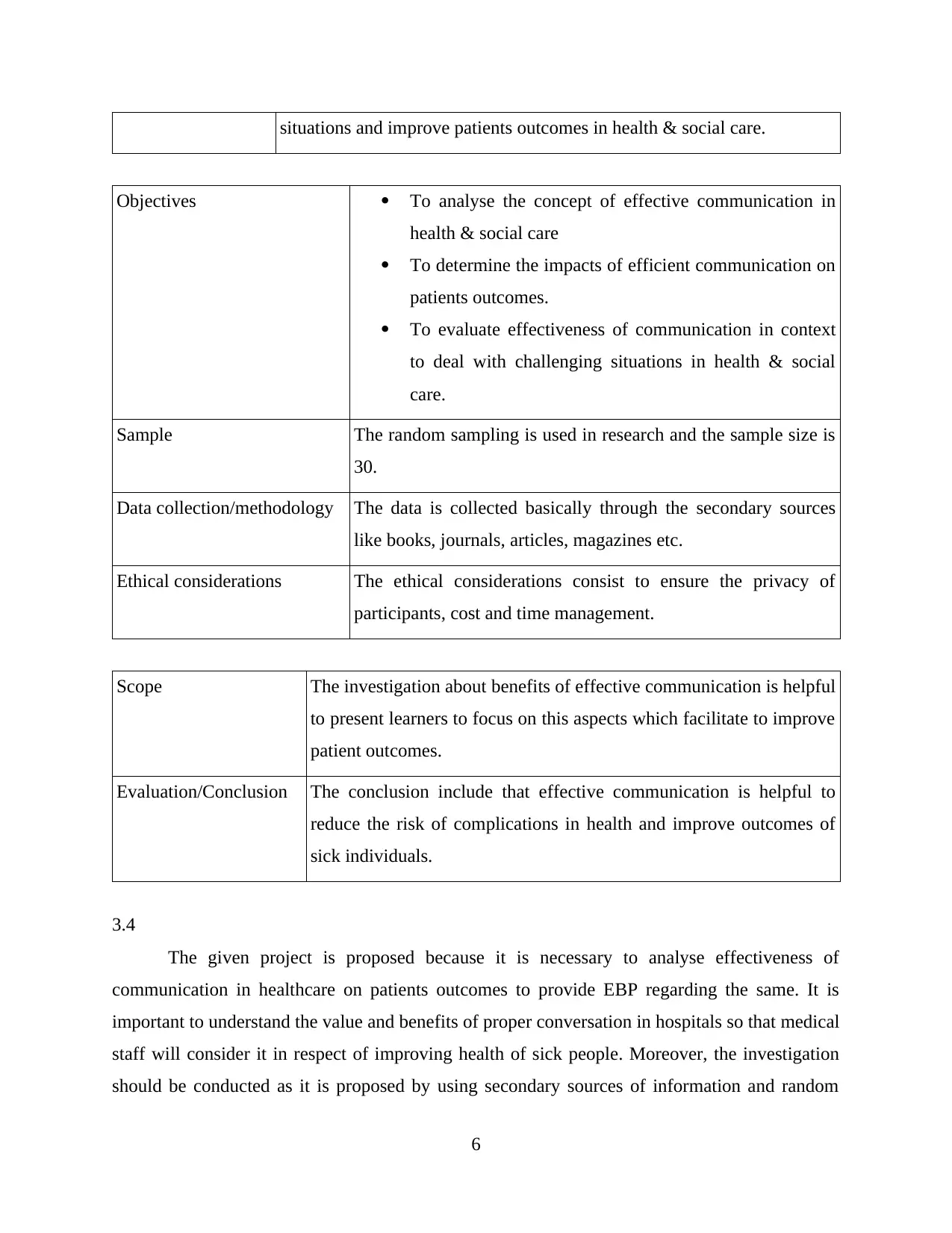
situations and improve patients outcomes in health & social care.
Objectives To analyse the concept of effective communication in
health & social care
To determine the impacts of efficient communication on
patients outcomes.
To evaluate effectiveness of communication in context
to deal with challenging situations in health & social
care.
Sample The random sampling is used in research and the sample size is
30.
Data collection/methodology The data is collected basically through the secondary sources
like books, journals, articles, magazines etc.
Ethical considerations The ethical considerations consist to ensure the privacy of
participants, cost and time management.
Scope The investigation about benefits of effective communication is helpful
to present learners to focus on this aspects which facilitate to improve
patient outcomes.
Evaluation/Conclusion The conclusion include that effective communication is helpful to
reduce the risk of complications in health and improve outcomes of
sick individuals.
3.4
The given project is proposed because it is necessary to analyse effectiveness of
communication in healthcare on patients outcomes to provide EBP regarding the same. It is
important to understand the value and benefits of proper conversation in hospitals so that medical
staff will consider it in respect of improving health of sick people. Moreover, the investigation
should be conducted as it is proposed by using secondary sources of information and random
6
Objectives To analyse the concept of effective communication in
health & social care
To determine the impacts of efficient communication on
patients outcomes.
To evaluate effectiveness of communication in context
to deal with challenging situations in health & social
care.
Sample The random sampling is used in research and the sample size is
30.
Data collection/methodology The data is collected basically through the secondary sources
like books, journals, articles, magazines etc.
Ethical considerations The ethical considerations consist to ensure the privacy of
participants, cost and time management.
Scope The investigation about benefits of effective communication is helpful
to present learners to focus on this aspects which facilitate to improve
patient outcomes.
Evaluation/Conclusion The conclusion include that effective communication is helpful to
reduce the risk of complications in health and improve outcomes of
sick individuals.
3.4
The given project is proposed because it is necessary to analyse effectiveness of
communication in healthcare on patients outcomes to provide EBP regarding the same. It is
important to understand the value and benefits of proper conversation in hospitals so that medical
staff will consider it in respect of improving health of sick people. Moreover, the investigation
should be conducted as it is proposed by using secondary sources of information and random
6
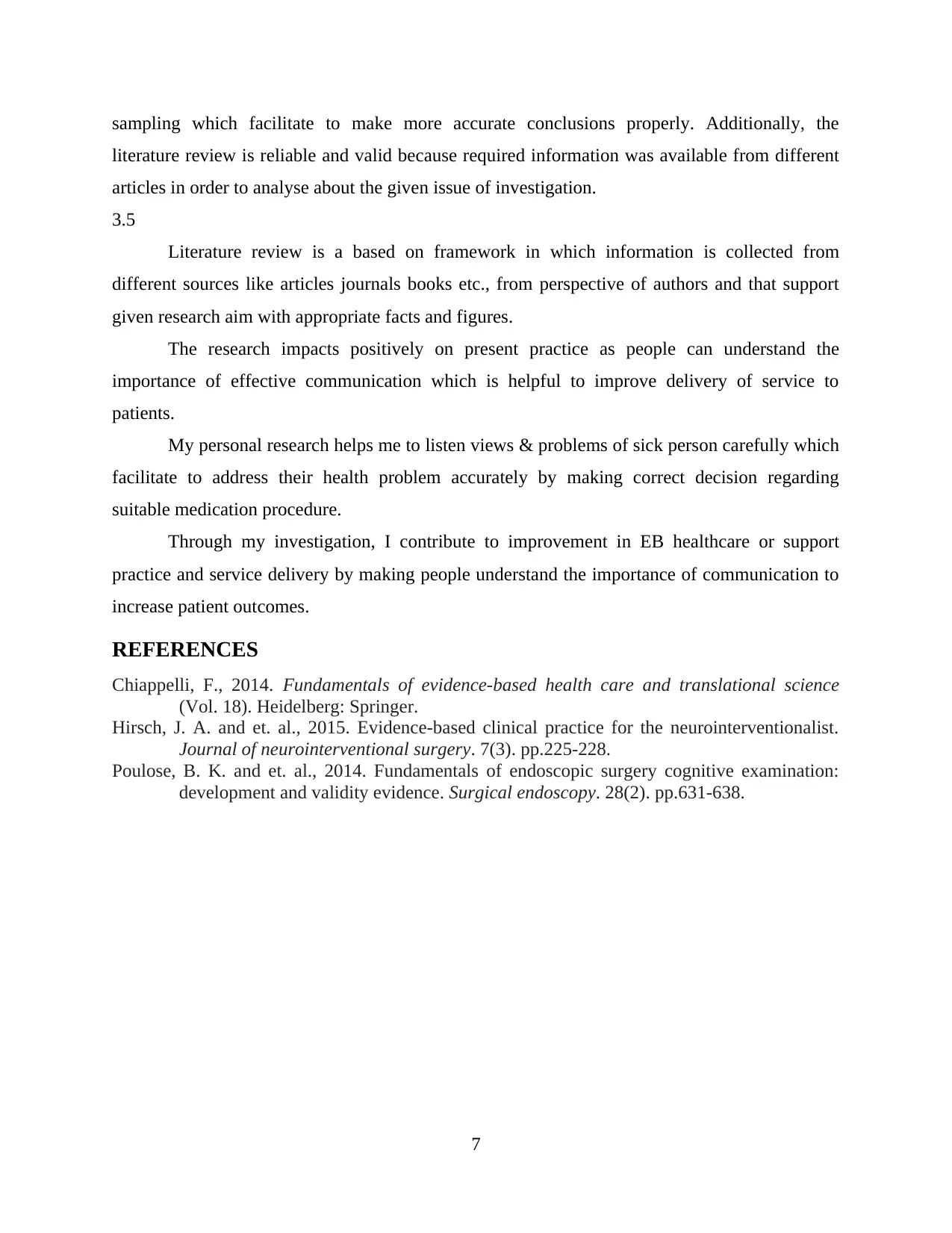
sampling which facilitate to make more accurate conclusions properly. Additionally, the
literature review is reliable and valid because required information was available from different
articles in order to analyse about the given issue of investigation.
3.5
Literature review is a based on framework in which information is collected from
different sources like articles journals books etc., from perspective of authors and that support
given research aim with appropriate facts and figures.
The research impacts positively on present practice as people can understand the
importance of effective communication which is helpful to improve delivery of service to
patients.
My personal research helps me to listen views & problems of sick person carefully which
facilitate to address their health problem accurately by making correct decision regarding
suitable medication procedure.
Through my investigation, I contribute to improvement in EB healthcare or support
practice and service delivery by making people understand the importance of communication to
increase patient outcomes.
REFERENCES
Chiappelli, F., 2014. Fundamentals of evidence-based health care and translational science
(Vol. 18). Heidelberg: Springer.
Hirsch, J. A. and et. al., 2015. Evidence-based clinical practice for the neurointerventionalist.
Journal of neurointerventional surgery. 7(3). pp.225-228.
Poulose, B. K. and et. al., 2014. Fundamentals of endoscopic surgery cognitive examination:
development and validity evidence. Surgical endoscopy. 28(2). pp.631-638.
7
literature review is reliable and valid because required information was available from different
articles in order to analyse about the given issue of investigation.
3.5
Literature review is a based on framework in which information is collected from
different sources like articles journals books etc., from perspective of authors and that support
given research aim with appropriate facts and figures.
The research impacts positively on present practice as people can understand the
importance of effective communication which is helpful to improve delivery of service to
patients.
My personal research helps me to listen views & problems of sick person carefully which
facilitate to address their health problem accurately by making correct decision regarding
suitable medication procedure.
Through my investigation, I contribute to improvement in EB healthcare or support
practice and service delivery by making people understand the importance of communication to
increase patient outcomes.
REFERENCES
Chiappelli, F., 2014. Fundamentals of evidence-based health care and translational science
(Vol. 18). Heidelberg: Springer.
Hirsch, J. A. and et. al., 2015. Evidence-based clinical practice for the neurointerventionalist.
Journal of neurointerventional surgery. 7(3). pp.225-228.
Poulose, B. K. and et. al., 2014. Fundamentals of endoscopic surgery cognitive examination:
development and validity evidence. Surgical endoscopy. 28(2). pp.631-638.
7
⊘ This is a preview!⊘
Do you want full access?
Subscribe today to unlock all pages.

Trusted by 1+ million students worldwide
1 out of 9
Related Documents
Your All-in-One AI-Powered Toolkit for Academic Success.
+13062052269
info@desklib.com
Available 24*7 on WhatsApp / Email
![[object Object]](/_next/static/media/star-bottom.7253800d.svg)
Unlock your academic potential
Copyright © 2020–2026 A2Z Services. All Rights Reserved. Developed and managed by ZUCOL.





